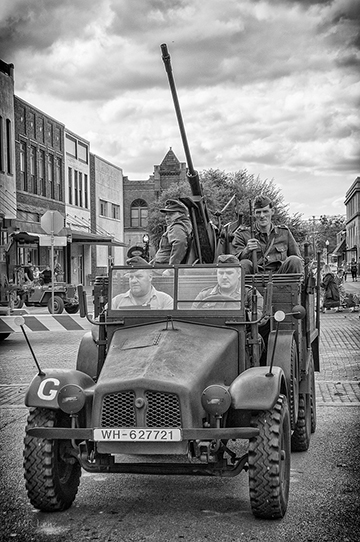About The Author
(in his own words):

The author was born in Munich,
Germany, in 1922. As his Father's employment was
with the German state railways his very early
childhood was spent in and around various
railway stations in southern Germany and on the
Austrian border. Not exactly a healthy
environment for an inquisitive little boy so his
parents decided, probably for safety reasons,
having seen their numerous cats end up under the
wheels of fast- moving trains, to send him to
boarding school for four years' spartan Catholic
education. This was followed by two years at
Gymnasium (grammar school). By this time Hitler
had gained power so at the age of 12 he'd joined
the Jungvolk, compulsorily. For some reason he
was never recruited to the Hitlerjugend. An
apprenticeship followed, qualifying in cabinet
making and in 1941, age 18 he was drafted into
the Arbeitsdienst (labor service) for 6 months.
In Autumn '41 he answered his
call-up papers for military training with the
Leichte Flak Ersatzabteilung 97 in
Friedrichshafen, Lake Constance, then was sent
to France at the beginning of '42 for grouping
into front units and in March found himself on
transport to the eastern front to join Armee
Group South, attached to the Sixth Armee (von
Paulus) and was involved in battles around
Kharkov, Izyum and Barvenkovo. Subsequently his
flak unit was attached to Armee Group `A',
General von Kleist's First Panzer Armee, taking
part in the fighting around Rostov on Don and
the push down towards Croznyy in the Caucasus.
Contracting jaundice in January `43 a harrowing
train journey lasting two weeks returned him to
a hospital in Austria then convalescent leave.
In March `43 he was again en
route to the Russian killing fields via Vitebsk,
Smolensk, Kursk and Orel and the general
wasteful retreating battles of Armee Group
Centre right into Kovel, which was declared a
Fester Platz (fortified place) by Hitler,
meaning `no surrender'. Trapped there for many
weeks he was one of a very few who miraculously
escaped and proceeded to Warsaw and the
inevitable retreat into East Prussia. From there
he was pulled out and redeployed to the western
front, the `Westwall' against General Patton's
Third Armee.
Wounded for the third time in
December `44 he spent some time in hospital in
central Germany and then a well-earned home
leave. The following March while en route to
join his unit, now facing the advancing Russians
into Germany, he was arrested by the Gestapo as
a suspected deserter and came very close to
being summarily shot. Saved by another
miracle...
He ended up with the 11th Armee
in the Harz Mountains where he surrendered to
the Americans in mid April `45, and was employed
by them until 1946 in what they called a
`chemical company' defusing large quantities of
artillery grenades and disposing of other highly
dangerous goods. In `46 he was sold out to the
French to work in the Potash mines in Alsace
until 1948, was then made a `travailler libre' `Freiarbeiter',
(free laborer) though there was no freedom
involved, as he remained a prisoner there until
1950.